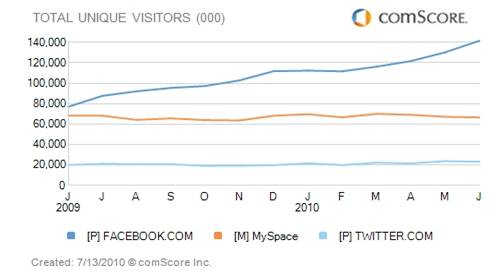
Mark Zuckerberg is pulling Facebook into the spotlight. The Social Network, which premiers this week-end, depicts the founder as being untrustworthy. Despite this alleged lack of integrity, Mark Zuckerberg has risen in less than 2 years to the number 35 richest individual in Forbes, surpassing Steve Jobs. It is probably not coincidental that Zuckerberg just pledged $100 million to the worst school district in the US.
Is Facebook really magical or a myth?
Business Week/Bloomberg's article, by Brad Stone, "Facebook Sells Your Friends" explores both possibilities.
The article reports that globally Facebook monthly unique visitors are 550 million and U.S. monthly unique visitors are up at 165 million.
Facebook's U.S. unique visitor trend had stalled at about 110 million from December 2009 to February 2010. It's growth to 165 million started when Facebook made everything you publish public (unless you "opt out") and introduced the Like button on partner websites across the internet. We asked comScore if clicking the Like button on a Facebook partner site (which is automatically published on your Facebook page) counts you as a unique visitor even if you never directly access your page on facebook.com, but we haven't received an answer yet. UPDATE: According to Comscore representative, Stephanie Flosi, the answer is: "NO, they would not be counted unless they actually visited Facebook.com". 
Unfortunately, this means that Facebook's low conversion rates for advertisers are low because in fact people don't respond to ads: "The average ad is clicked on by less than a tenth of a percent of the site's users, according to advertisers and analysts, including Greg Sterling, a San Francisco-based Internet marketing consultant."
This remarkably low response rate may be why, in the article, a small business owner can't afford to continue using Facebook even if he thinks it is better than Google:
David Belden, founder of Residential Solar 101, a San Francisco re-seller of solar panels, says of Facebook, "I can target my exact audience." Belden, who was spending about $4,000 a month on Facebook earlier in the year before he was forced to rein in his marketing expenses because of budget issues, adds: "If I was bidding on expensive Google keywords like 'solar,' I'd be going against guys with a much larger marketing budget."
But it may be that a much larger marketing budget has the advantage on Facebook as well. For example, Nike's World Cup "Write the Future" campaign, which represented probably over $300 million in league sponsorships and actual media investment:
...Hundreds of millions of people saw 'Write the Future' on television. Before it blanketed traditional media, however, Nike launched the video on Facebook... Then it was passed from friend to friend, often with comments and members recommending it... more than 9 million times by Facebook users... Getting the ad onto Facebook cost a few million dollars, according to the companies... David Grasso, Nike's chief marketing officer, says Facebook 'is the equivalent for us to what TV was for marketers back in the 1960s. It's an integral part of what we do now.'
Facebook is given undue credit for the success of the Nike's World Cup campaign.
When there is the fan engagement of the World Cup event, the appeal of the talent in the ads which Nike pays enormous amounts of money to have access to, the reach of Nike's television advertising, and the entertainment value of Nike's creative, Facebook may give a marketer a chance to actually see and measure the "water cooler" multiplier effect of those combined assets, for "a few million dollars".
Clearly this "case study" is hardly replicable by almost anyone else, especially small to medium sized businesses. Whatever Facebook's multiplier effect , it only creates value if there's something to multiply.
At the WARC Future of Advertising Research conference, "Ernie Kim, senior VP at Synovate, said that online channels' effectiveness is... often overestimated". This article entitled: "Researchers Warn on Media Measurement" goes on to recommend the importance of studying the impact of marketing mix. Certainly the use and timing of different media channels can alter the impact of any one medium's performance.
Instead of encouraging media to fight each other over the shrinking advertising pie, by building a case that one medium is better than another, the brands and the media companies may find mutual benefit by identifying how one medium can multiply the response rate of another. Once a new higher benchmark is established, then the individual media would be motivated to collaborate with each other to continue to find new highs.
This would be much more productive than motivating the creation of myths to cover up new lows in response rates. In the meantime, read about marketing alternatives to Facebook for the "Rest of Us" here.